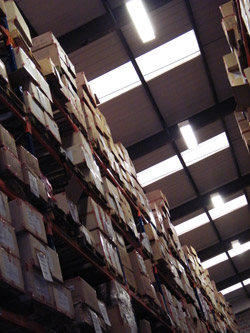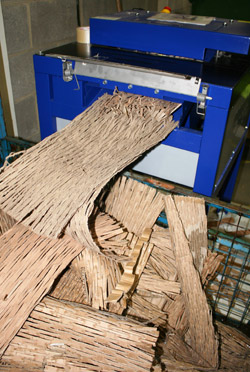Our Packaging

As an Ethical business, part of our core responsibilities are aimed towards the way in which we conduct ourselves day to day and the processes, procedures and materials used in our daily operations.
Why do you sometimes use so much packaging?
The packing materials we use are
- Recycled double wall boxes
- Paper bubble wrap alternative
- Unbleached kraft roll and PVC free packing tape
- Reused boxes, such as those in which we receive our stock from our suppliers
- 100% recycled paper void fill
- Paper tape
We want your order to reach you in one piece with no damages and if we were to reduce the amount of this packing we run the risk of your goods being damaged in transit, particularly if glass and liquids have been ordered. Such breakages could also damage other customers' goods on the same vehicle.
All such damages need to be replaced, which involves more delivery miles in order to either collect damaged consignments and re-deliver them or simply to send out replacement items.
Why should I order over the Internet? Delivery vehicles clog up the environment!
 We handle a great many orders for our customers every day. These are typically collected by 40 foot articulated trailers, carrying some 2,000 to 3,000 orders. The orders are then transferred to smaller vehicles once they have been sorted at the courier’s central distribution hub. The final destination vehicles may be transit vans or cars, which will deliver anything from 30 to 50 orders per day. So our customers have in effect taken 3,000 car journeys off the road. Together with the continual advances being made in vehicle technology resulting in reduced carbon emissions, this represents a considerable reduction in the overall carbon footprint of our business.
We handle a great many orders for our customers every day. These are typically collected by 40 foot articulated trailers, carrying some 2,000 to 3,000 orders. The orders are then transferred to smaller vehicles once they have been sorted at the courier’s central distribution hub. The final destination vehicles may be transit vans or cars, which will deliver anything from 30 to 50 orders per day. So our customers have in effect taken 3,000 car journeys off the road. Together with the continual advances being made in vehicle technology resulting in reduced carbon emissions, this represents a considerable reduction in the overall carbon footprint of our business.
Running a car in built up areas can cost around 55 to 80 pence per mile including depreciation, maintenance, insurance, tax and MOT. We charge £3. 95 per standard delivery; equivalent to a 5 to 7 mile round trip in a car.
RECYCLING OUR PACKAGING
In addition to buying recycled and recyclable packaging, all of the excess day to day packaging used in our fulfilment centre is compacted, bailed and collected by a local recycling company. Our aim is to increase recycling waste and reduce land fill waste by 5% every three months of the year.
IN OUR WAREHOUSE
We manage 250,000 sq. feet of warehouse space, which  uses a considerable amount of power to operate, particularly during the darker months of Winter. In order to reduce our energy consumption wherever possible we looked towards more innovative methods of lighting to save energy.
uses a considerable amount of power to operate, particularly during the darker months of Winter. In order to reduce our energy consumption wherever possible we looked towards more innovative methods of lighting to save energy.
In December 2011 we installed auto-switch lights in each warehouse aisle. This makes lights go on as movement is detected in the area and go out when there is none. As a result of this initiative alone we have reduced our consumption from 390Kwh to 294Kwh, saving 25%.
We have also installed a cardboard shredding machine so that boxes that are not suitable for reuse can be shredded and the shredded produce used as parcel filler and added protection for parcels. This can then be recycled with all other paper/cardboard waste by the customer.
IN OUR CONTACT CENTRE
Our contact centre has played its part in reducing the impact our business has on our planet by reducing our carbon footprint.
All PC and printing equipment is shut down when not in use and we only have some of the contact centre lights on during daylight hours, which has reduced our energy consumption significantly. Simply by re-deploying the contact centre to an office with windows has massively impacted our energy consumption in a great way. We recycle all of our own printed/copied paper and plastic drinking cups.
In addition to the above, we 'Eco-check' any new process/procedure to reduce our carbon footprint and to date we have introduced Customer Service Solutions, which have reduced our paper consumption by over 20,000 sheets in the last 2 years which again has also added to reducing energy consumption.
We constantly strive to adopt green policies within the contact centre and in line with company policy, focus on and champion new initiatives. Examples include home working initiatives that negate travel to and from work and have encouraged a cycle to work scheme for all staff.

